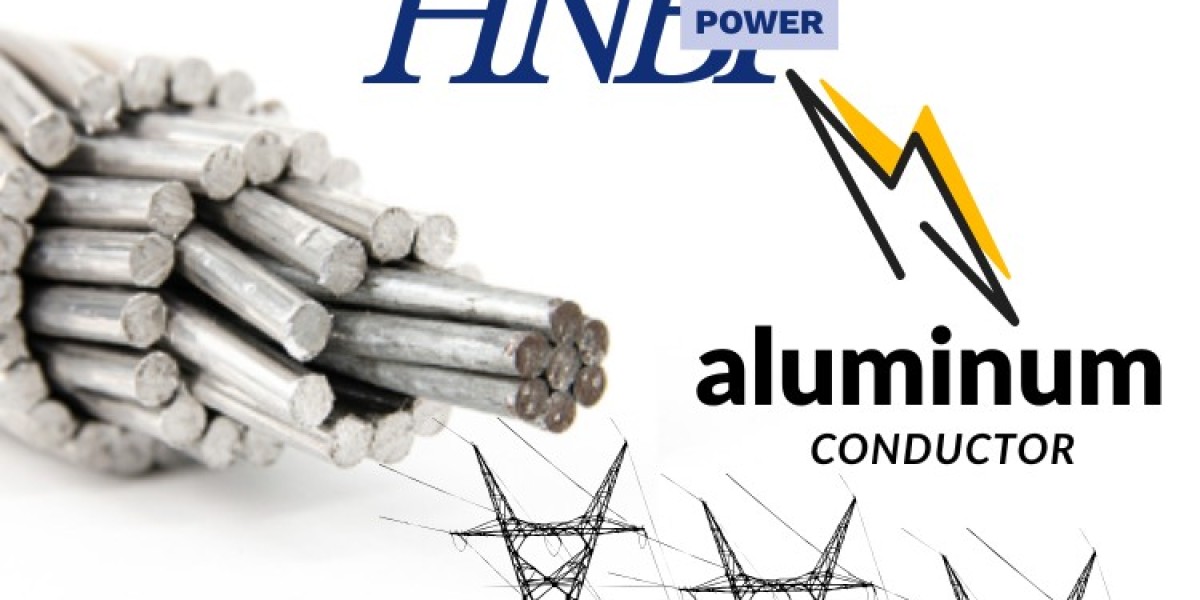Aluminum conductors remain one of the most widely used materials in overhead transmission and distribution systems due to their lightweight structure, corrosion resistance, and excellent conductivity-to-weight ratio. As global power utilities upgrade grids, the demand for high-quality aluminum conductor technologies continues to rise. HNBF Power, a trusted manufacturer of overhead conductors and power cables, delivers engineered aluminum conductor solutions designed for utility, industrial, and infrastructure applications.
What Is an Aluminum Conductor?
An aluminum conductor is a metallic conductor made from high-purity aluminum strands or aluminum alloy wires. It is commonly used in electrical power transmission and distribution lines because it offers significantly lower weight than copper while maintaining efficient conductivity. For overhead lines, aluminum is often reinforced with steel or manufactured as an alloy to achieve greater strength.
HNBF Power specializes in multiple categories of aluminum-based overhead conductors, including AAC (All Aluminum Conductor), AAAC (All Aluminum Alloy Conductor), and ACSR (Aluminum Conductor Steel Reinforced), each designed to meet the demanding requirements of modern networks.
Types of Aluminum Conductors Manufactured by HNBF Power
1. AAC – All Aluminum Conductor
AAC is produced from 99.7% pure aluminum, offering excellent conductivity and flexibility. It is primarily used in urban distribution networks where spans are shorter, and high electrical performance is required.
Key advantages:
High conductivity
Lightweight for easier installation
Suitable for dense urban power grids
2. AAAC – All Aluminum Alloy Conductor
AAAC is manufactured using aluminum-magnesium-silicon alloys, which provide higher mechanical strength compared to AAC. This makes AAAC suitable for long-span transmission lines.
Key advantages:
High tensile strength
Improved corrosion resistance
Longer service life in harsh environments
3. ACSR – Aluminum Conductor Steel Reinforced
ACSR combines aluminum strands with a steel core, enabling higher tensile capacity and excellent mechanical performance. It is widely used for high-voltage transmission systems.
Key advantages:
Superior strength-to-weight ratio
High current carrying capacity
Suitable for long distances and heavy-load applications
Performance Characteristics of Aluminum Conductors
For procurement teams and electrical engineers, evaluating performance characteristics is crucial. HNBF Power’s aluminum conductors deliver:
High Electrical Conductivity
Aluminum provides excellent performance for overhead lines, ensuring minimal losses during long-distance transmission.
Mechanical Strength and Durability
Whether pure aluminum, alloy, or steel-reinforced, the conductors are engineered to withstand extreme weather conditions, mechanical stress, and continuous electrical load.
Corrosion Resistance
Aluminum naturally forms a protective oxide layer, making it ideal for coastal, industrial, and high-moisture environments.
Cost and Weight Efficiency
Aluminum conductors are significantly lighter and more cost-effective than copper, reducing installation and tower-loading costs.
Applications in Power Transmission and Distribution
HNBF Power’s aluminum conductors are widely used in:
Rural and urban distribution lines
High-voltage transmission grids
Industrial plant power systems
Renewable energy projects (solar, wind evacuation lines)
Utility network upgrades and grid expansion projects
Because of their mechanical and electrical flexibility, they remain the preferred choice for both new installations and refurbishment projects.
Why Choose HNBF Power for Aluminum Conductors?
HNBF Power combines engineering expertise with high-precision manufacturing standards to deliver conductors that meet international specifications. With global supply capability and strict quality control, the company ensures that every conductor provides superior reliability, performance consistency, and long operational life.
Frequently Asked Questions (FAQs)
1. What standards do HNBF Power aluminum conductors follow?
HNBF Power manufactures aluminum conductors following major international standards to ensure compatibility with global power infrastructure requirements.
2. Which conductor is best for long-span transmission lines?
ACSR and AAAC are recommended due to their high tensile strength and resistance to mechanical stress.
3. Can aluminum conductors be used in coastal environments?
Yes. AAAC and AAC conductors offer excellent corrosion resistance, making them suitable for coastal and industrial regions.
4. What factors should procurement teams consider when selecting an aluminum conductor?
Key factors include tensile strength, conductivity, span length, environmental conditions, and system voltage.
5. Does HNBF Power provide customized aluminum conductor solutions?
Yes. HNBF Power engineers can design conductor specifications tailored to project requirements.
Ready to upgrade your transmission or distribution network?
Contact HNBF Power today to discuss customized aluminum conductor solutions tailored to your project needs.








